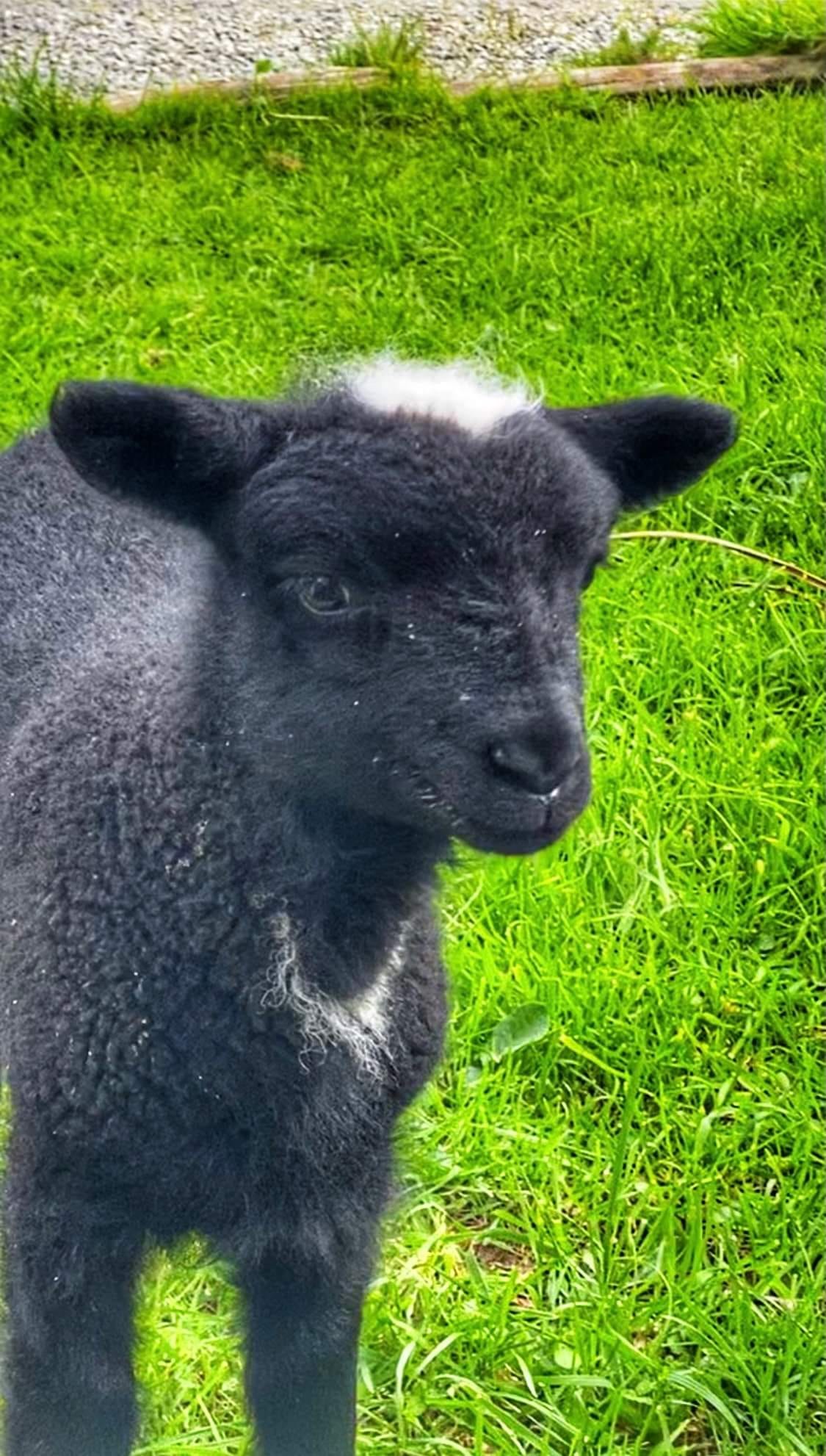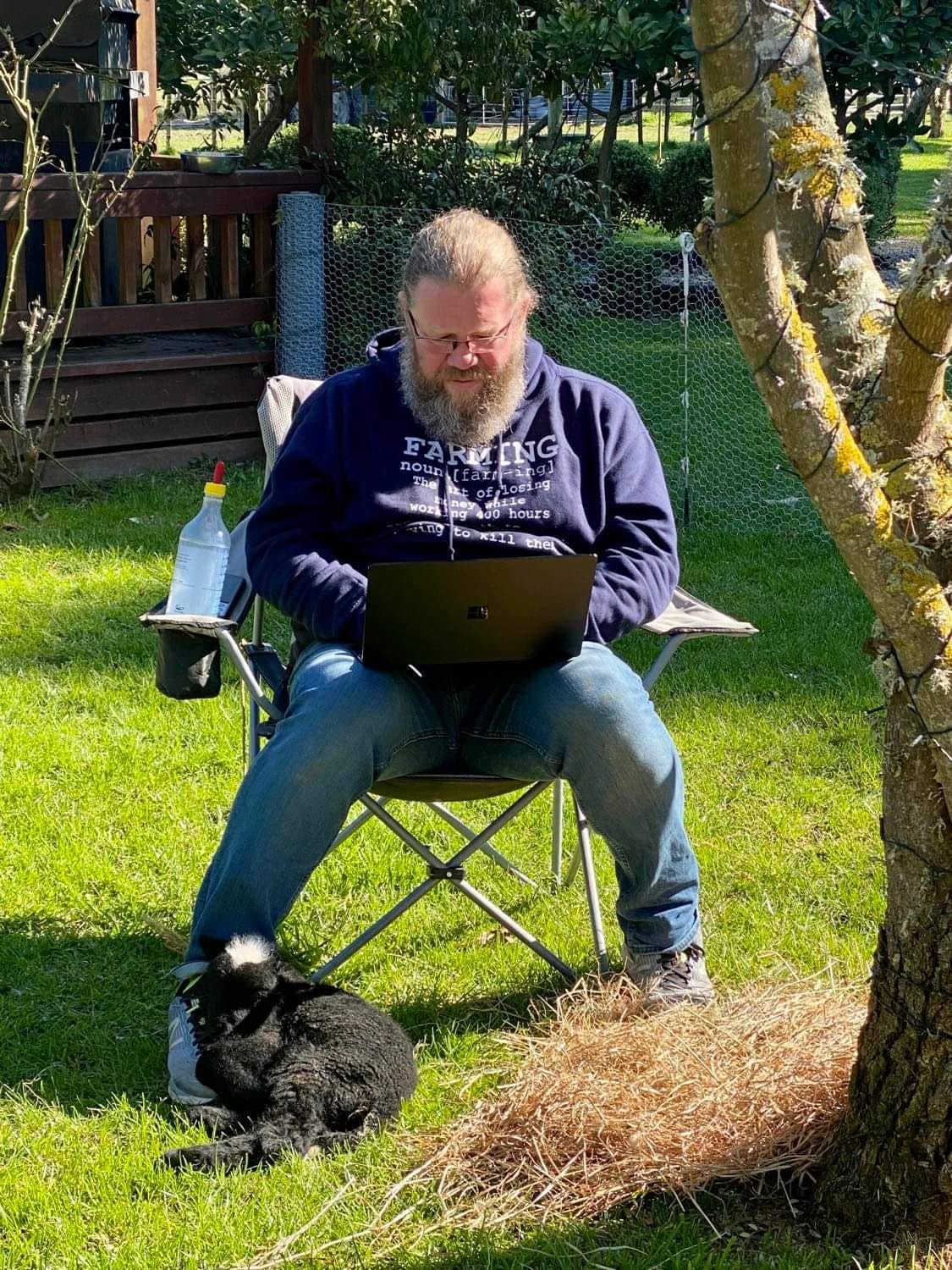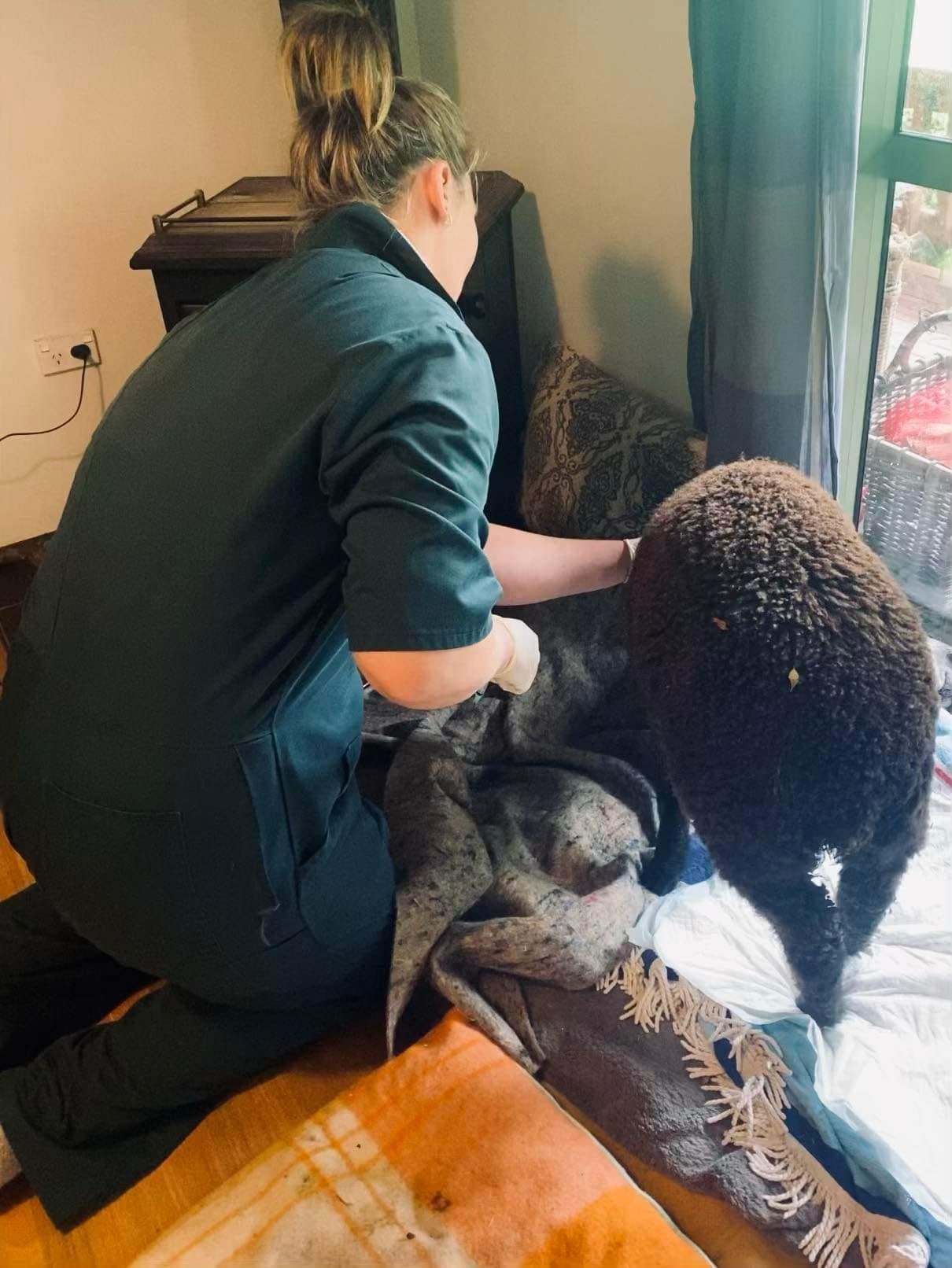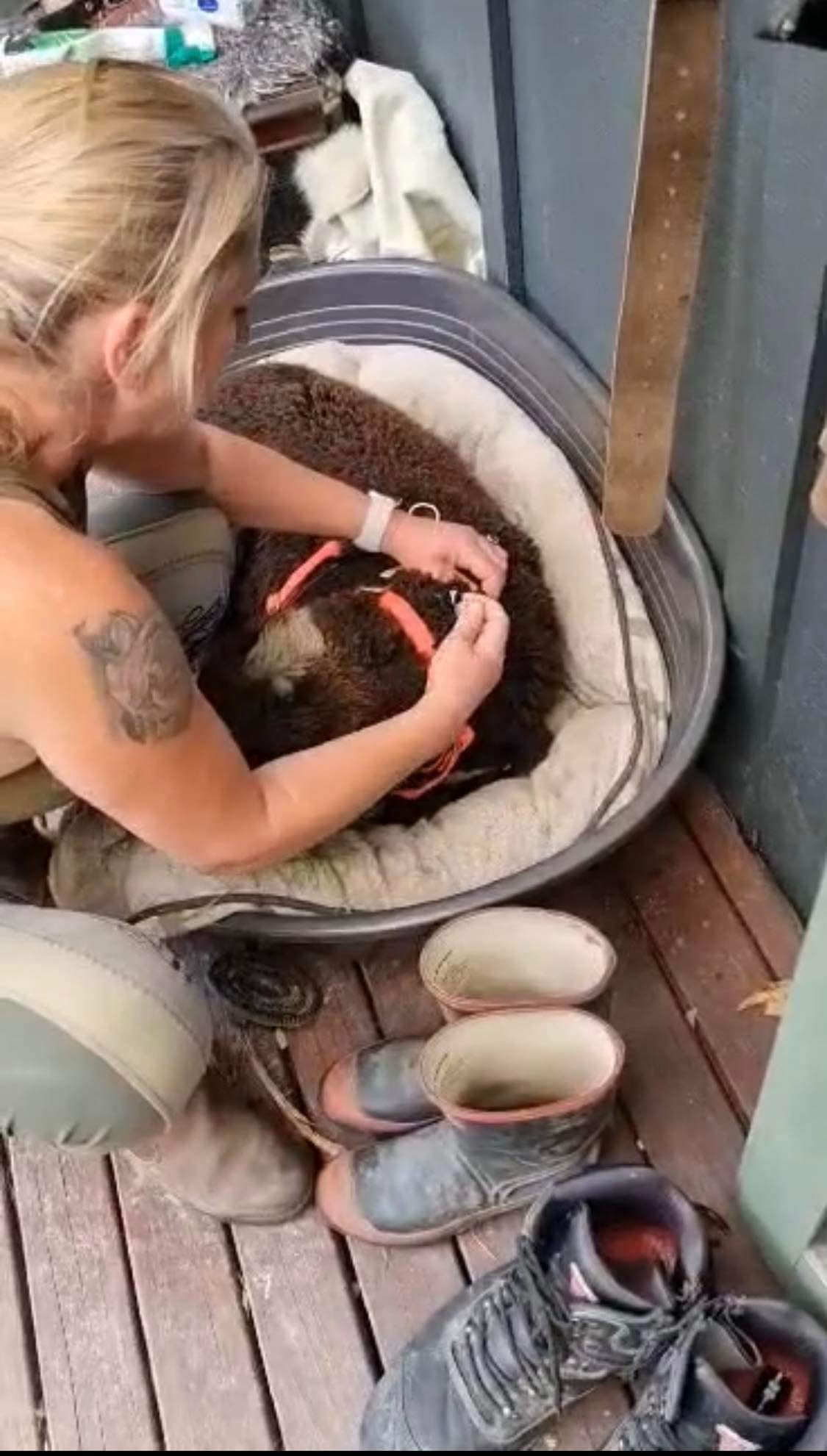With some sadness, I write to inform you that Rupert, the newest sheep to the herd, passed away early this morning, peacefully, surrounded by family. After a very brief illness, Rupert shuffled off his mortal skin and left for sheep heaven. This article is to remember him and his short time in the world.
Rollback a few months, and K and I were down in the bottom paddock. We were surveying the glamping site, which included a bit of day drinking. It is most essential to be relaxed when planning out complex things like site preparation.
The heifers were trying to destroy the ute, after all we had parked it in their paddock, and the dogs were whizzing around with the ball. All in all, it wasn’t a bad day after weeks of rain, and then K spotted one of the ewes lying on its side in a neighbouring paddock.
She went over to investigate and found a lamb stuck halfway out with the ewe in the process of trying to give birth and failing. Removing the lamb, clearing airways, and reviving it, she tried to coax the ewe to take it back, but the ewe was having none of it.
A psychotic brain explosion that only sheep can have decided that the lamb was some mortal enemy and K its satanic master. It repeatedly ran at them both in a murderous eye-rolling rage. K gathered up the lamb, now clearly an orphan, our first, and walked up to the house with it.
Rupert had been born.
“The sheep had been on my farm now for three months, for most of that time they had been a nightmare. And for all of it they'd been ruinously expensive. But these belligerent, sex mad, illness machines had brought a lot of joy to the farm. I'd grown to love having them around." - Jeremy Clarkson
Every other week you hear of another sheep misadventure from the locals. The tale always ends with everyone shaking their head and saying, “Bloody sheep.”
Sheep, according to Clarkson, are hell-bent on annoying the shepherd and come with an inbuilt death wish, cunningly finding ways to take themselves out. Clarkson mused that if sheep ever learned to ride a motorbike, they would all buy high-powered Japanese death machines.
Sheep escape; we still have one on a neighbouring farm, running with the farmer’s cows. He will taunt us from the road, then disappear back into the fifty strong herd as if it to say, “Come get me if you can!”
Far from being docile, they will suddenly go from what appears to be complete panic to turning on you as a single mob, eyeing you, and stamping their feet in unison. It can be a very Children of the Corn moment.
They have an inbuilt sixth sense for detecting when a gate has been left open. They can be in the bottom paddock and know that the furthest gate has been left ajar. Then, like woolly ninjas, they don an invisibility cloak, and the next thing you know is that they are all standing on the deck looking at you through the window.
Sheep are naturally attracted to eating things that will kill them. Perhaps they do this out of spite. If there is something left around that they shouldn’t eat, you can be sure that they will make a beeline for it. They can swarm through a garden like a plague of locusts.
If bored, sheep will run headlong into each other. Particularly the rams. These head cracking episodes cause a loud “boom!”, and the loser often ends up sitting there dazed. The winner takes the high ground standing on the tallest object and shaking their head at the rest of the group.
Worse, sheep are complicated, “give me cattle any day”, one farmer said to us. They have a complex system of multiple stomachs and, rather like a high-powered Japanese motorbike, many things can go wrong with them.
Rupert started life in a large dog crate, immediately put onto colostrum and requiring small feeds every couple of hours. K stayed up through the night next to him, in fact over a few nights, to make sure that he had the best start to life. “It’s like having a newborn,” she said to me.
A pen was created near the house, and Rupert spent the day running up and down the fence line screaming like his throat was cut whenever he saw us. The dogs were not immune, each of them nannied Rupert as best they could and Rupert responded by bunting them at every opportunity.
He grew fast. He grew fat. Any hint of a lamb bottle was hunted down with great abandon, latching on and sucking like an alcoholic who’s just been released from Accident and Emergency after their latest misadventure and retrieving a half a can of Elephant Beer in the carpark where they managed to stash it on their way in.
Over time, Rupert became convinced he was a dog. When he wasn’t bunting us and trying to drink my Double Brown, he’d run with the dogs when they chased the ball, leaping and cavorting as lambs do and cuddling up to the wolfhound, Koda, who he took a great liking to.
He took so much of a liking to Koda that he tried to hump him. Being nearly forty kilograms of Irish hunting dog, the wolfhound took all this in his stride and ignored the amorous advances.
Rupert liked luxury. Often we’d come back into the house to find him sleeping on the couch. His ninja powers came early, and once, we even saw him passed out in a milk coma on the bed.
Sheep have been around for thousands of years, the earliest domestic herds appearing around 4000BC in old Babylon. They were revered by early civilisation because they provided milk, meat, and wool.
They appear in every significant mythology from then on into the present day. Sheep and lamb iconography and parables are still delivered from pulpits worldwide every Sunday.
Several deities have been born from the lowly sheep’s influence, including the Egyptians, who had not one but two ram-headed gods.
The one that you will be most familiar with I would suggest is Pan. Pan is a Greek God concerned with protecting sheep, shepherds, and goats. One of the moons of Saturn is named after Pan, ever watching high above us in the night sky.
One of Pan’s characteristics is the ability to shout so loud it scares people; the word “panic” is likely derived from this deity.
Christians, of course, being Christians and needing to evolve their religion in strange and mysterious ways, decreed that sheep went to heaven, but goats went to hell on account of their cloven hooves.
Not very fair on goats until you’ve owned them, and after they’ve pulled down the clothesline for the third time and eaten your washing, you can see why they annoyed the Christians.
Rupert was finally weaned and returned to the paddock with the rest of the herd. This did not suit him one iota, and he studiously ignored them for some days, despite them showing interest in bringing him back.
He was the lone sheep for a long time, happily eating his grass and hanging out with us at drinks time. He would sit between K and me, chewing his grass while the dogs bounded after the ball.
We left one morning to do a supply run, and when we got back, we noticed him with his head hanging down in the paddock. When we had left, he’d followed us up the fence line in his usual way, so this behaviour was abnormal, and alarm bells sounded.
Within an hour, it was clear that he was not well. Nothing was obvious, but you could see him slipping away little by little. K and I talked, and the vet was summonsed. She appeared soon after, advised that he was unwell, shot him full of antibiotics, B12, and painkillers, and told us to keep him hydrated.
Now, some people would have got the rifle out and dispatched Rupert then and there. We couldn’t, for a few reasons.
We needed to know what it was. Farms are full of diseases and strange viruses, worms, bugs, and other things. We wanted to make sure that whatever was causing Rupert’s ailment was not going to be a problem for other stock.
While the vet bills eventually ran into what Rupert would have paid us back if we were to have sold him, money wasn’t the point. Rupert’s welfare was the point of the exercise, and if we could save him, then we wanted to.
Of course, there is a delicate balance because if Rupert was suffering, we needed to do the correct thing and euthanise him. While he was ill, we monitored his pain levels endlessly and discussed whether or not to send him on his way.
On a slightly more practical level, Rupert was teaching us something. He was teaching us many things. The sheep bible of diseases was consulted (it’s extensive), and we learned more about the anatomy of a sheep in a few days than we would have in a month of classes.
K also learned to administer various kinds of medicine and understand their effects. She is now a dab hand at using needles on sheep.
In short, we did everything we could to save Rupert while not breaking the bank and putting his pain management first. Something that you see a lot of farmers doing. Even the hardest old school farmer will prepare for orphan lambs and make sure that they get the best start to life.
Rupert showed some recovery and then fell back into lethargy. He would sleep for a while, get up, and wander around, but he had temporary blindness and was unhappy by now.
We debated euthanising him again, all the while carrying on treatment, and then last evening, he came over to both K and me individually and put his head in our lap for a scratch.
It was as if he were telling us it was time for him to go. He’d spent the evening lying with us over a drink, the dogs had accommodated him as well, and even if he were blind, there was plenty of attention, noise, and the farm life all around him.
When he was a lamb, Rupert had taken over one of the dog beds. It became his bed for a time, and he was happy lying there with the world moving around him.
We put Rupert into his old bed and took him into the house. The hustle and bustle around him continued into the night, and he slept.
Then so did we.
Sometimes, I imagine that Pan wanders the valley out here in the dark of night. Especially on those misty or stormy nights, he is hidden in the part of the day when everything is sleeping, playing his pipes softly so as not to wake the dreaming shepherds.
Pan wanders the valley, checking on sheep, shepherds, and goats alike, making sure that all is well with them and perhaps, mischievously, opening the odd gate here and there so sheep can run free for a time.
Last night, I dreamed that Pan came over the little hill to our East, inside the Tararua’s shadow stretching long under a full moon. He crept through the pines and tall elms, hooves scuffing in the leaves, leapt the electric fence and danced across our lawn.
Then, with that silent sheep ninja capability, crept across the deck and through the door, no mean feat on wooden floors, to crouch down beside Rupert in his dog bed.
Rupert would have woken to find his kind-hearted god leaning down over him, brushing his wool, whispering that it was time to leave, that his purpose was done, and now he would wander to sheep heaven where there are no fences, all the milk you can drink, and endless sunny, warm days with long grass.
Rupert shook off his mortal coil, leaving the vessel he had travelled only a few weeks in, and with Pan by his side, ran and jumped, frolicking, through the full moonlight into new pastures. The fading of the pipes heralding his latest adventure.
Rupert died in his sleep overnight. He was in classic lamb pose, no sign of pain, no struggle; in fact, we thought he was just asleep for a while.
We took his body, and we buried it in the orchard. His remains will feed many trees, and there is an irony to it, as Rupert’s favourite thing was fruit trees, much to our annoyance.
While Rupert is now leaping with Pan and the other sheep somewhere, what he leaves behind will not be wasted and a reminder to us.
While this has been a sad adventure, this one sheep taught us so much, for which we are grateful. One orphan lamb has set us up to help the next, and the next, and the next, as well as all the livestock.
So here is an ode to Rupert, the most excellent lamb that ever lived at Waihakeke Road, a clever soul who made all our lives richer.
Raise your glass, reader, to Rupert.










Sorry to hear of wee Ru's passing guys .. big hugs to you and K. It's OK to cry for a lamby xox